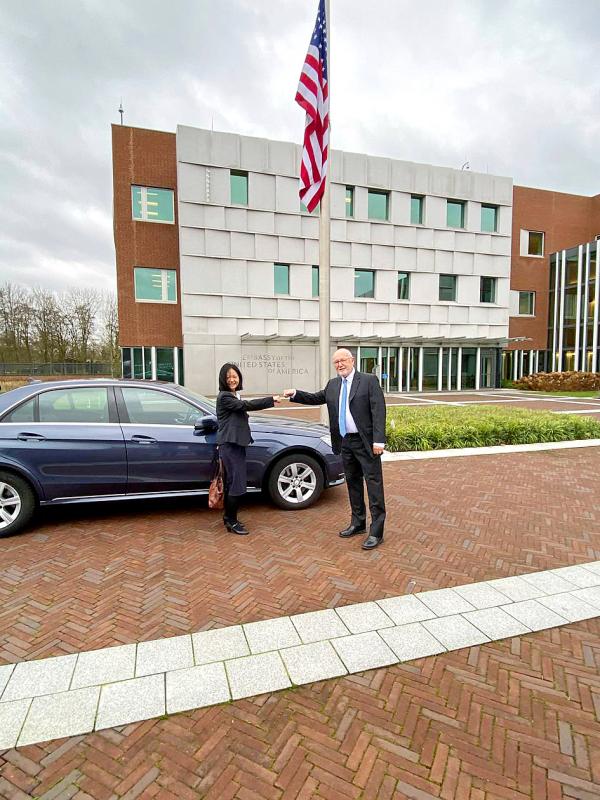US Ambassador to the Netherlands Pete Hoekstra on Monday shared photographs of his meeting with his Taiwanese counterpart, Chen Hsing-hsing (陳欣新), at the US embassy in The Hague, after Washington lifted restrictions on official contacts with Taipei.
Two days earlier, US Secretary of State Mike Pompeo said that he was lifting the “self-imposed restrictions” on US-Taiwan relations.
“Made some history today: Welcomed Taiwan Representative Chen to our Embassy,” Hoekstra wrote on Twitter on Monday. “Glad that our @StateDept colleagues around the world will now be able to host our friends from this vibrant democracy on our Embassy grounds.”

Photo: Screen grab from the Taipei Representative Office in the Netherlands’ Facebook page
Chen replied on Twitter that she was pleased and honored to visit the US embassy in The Hague for “the very first time in my diplomatic career.”
The Ministry of Foreign Affairs welcomed Hoekstra’s improved relations with Chen, but cannot reveal the details of meetings with other governments, Department of European Affairs Deputy Director-General Kendra Chen (陳詠韶) told a news briefing in Taipei yesterday.
The US Department of State on Monday also announced that a closed-door meeting between US Assistant Secretary of State for Political-Military Affairs Clarke Cooper and Representative to the US Hsiao Bi-khim (蕭美琴) had been held that day at 11:30am.
Hsiao should resume the daily flag-raising at the Twin Oaks Estate in Washington, which ended in 1979, Chinese Nationalist Party (KMT) Legislator Charles Chen (陳以信) said yesterday.
Then-US president Barack Obama’s administration expressed its dissatisfaction after then-representative to the US Shen Lyu-shun (沈呂巡) held a flag-raising ceremony at the estate on Jan. 1, 2015.
Hsiao should also move the Republic of China flag hanging inside the Taipei Economic and Cultural Office in New York City outside to mark the breakthrough in ties, especially as the office and the UN headquarters are both on 42nd Street, Chen said.
The government has been taking steady and practical steps to deepen bilateral partnerships in different areas, ministry spokeswoman Joanne Ou (歐江安) said.

The Ministry of the Interior (MOI) is to tighten rules for candidates running for public office, requiring them to declare that they do not hold a Chinese household registration or passport, and that they possess no other foreign citizenship. The requirement was set out in a draft amendment to the Enforcement Rules of the Public Officials Election and Recall Act (公職人員選舉罷免法 ) released by the ministry on Thursday. Under the proposal, candidates would need to make the declaration when submitting their registration forms, which would be published in the official election bulletin. The move follows the removal of several elected officials who were

The Republic of China (ROC) is celebrating its 114th Double Ten National Day today, featuring military parades and a variety of performances and speeches in front of the Presidential Office in Taipei. The Taiwan Taiko Association opened the celebrations with a 100-drummer performance, including young percussionists. As per tradition, an air force Mirage 2000 fighter jet flew over the Presidential Office as a part of the performance. The Honor Guards of the ROC and its marching band also heralded in a military parade. Students from Taichung's Shin Min High School then followed with a colorful performance using floral imagery to represent Taiwan's alternate name

FOUR DESIGNATED AREAS: Notices were issued for live-fire exercises in waters south and northwest of Penghu, northeast of Keelung and west of Kaohsiung, they said The military is planning three major annual exercises across the army, navy and air force this month, with the navy’s “Hai Chiang” (海強, “Sea Strong”) drills running from today through Thursday, the Ministry of National Defense said yesterday. The Hai Chiang exercise, which is to take place in waters surrounding Taiwan, would feature P-3C Orion maritime patrol aircraft and S-70C anti-submarine helicopters, the ministry said, adding that the drills aim to bolster the nation’s offshore defensive capabilities. China has intensified military and psychological pressure against Taiwan, repeatedly sending warplanes and vessels into areas near the nation’s air defense identification zone and across

A Chinese takeover of Taiwan would severely threaten the national security of the US, Japan, the Philippines and other nations, while global economic losses could reach US$10 trillion, National Security Council Deputy Secretary-General Lin Fei-fan (林飛帆) wrote in an article published yesterday in Foreign Affairs. “The future of Taiwan is not merely a regional concern; it is a test of whether the international order can withstand the pressure of authoritarian expansionism,” Lin wrote in the article titled “Taiwan’s Plan for Peace Through Strength — How Investments in Resilience Can Deter Beijing.” Chinese President Xi Jinping’s (習近平) intent to take Taiwan by force